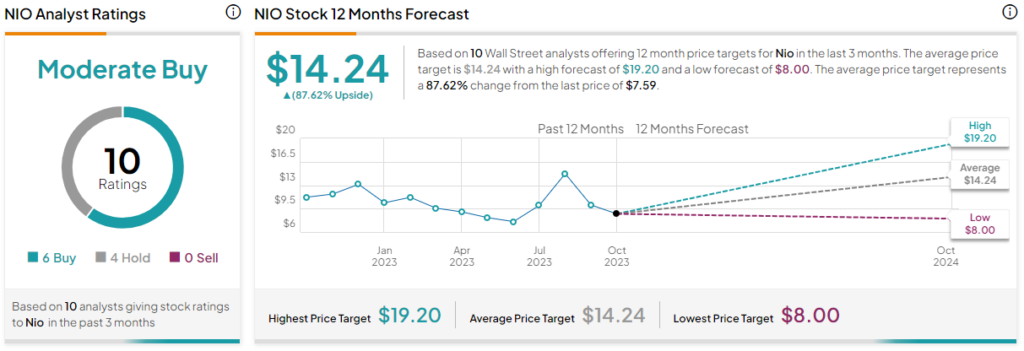While EVs may represent the future of mobility and transportation, Chinese sector manufacturer NIO (NYSE:NIO) may face a reckoning in its home market, just like other companies have suffered in their primary regions. Fundamentally, EV demand faces significant headwinds against broader economic pressures. Therefore, I am bearish on NIO stock until the dark clouds fade away.
Elevate Your Investing Strategy:
- Take advantage of TipRanks Premium at 50% off! Unlock powerful investing tools, advanced data, and expert analyst insights to help you invest with confidence.

NIO Stock Suffers from a Harbinger
What’s perhaps most worrisome for NIO stock and any other EV-related enterprise is the recent volatility in Tesla (NASDAQ:TSLA). Sparked by a disappointing performance in its third quarter of Fiscal Year 2023, Tesla appears to not have viable solutions. And while it’s fair to point out that the China market is obviously different from the U.S. market, Tesla is also the crown jewel of EV stocks.
At this point, the house that CEO Elon Musk built is synonymous with electric-powered transportation. So, any miss with the alpha dog impugns competitors downstream. After several key corporate victories, Tesla finally looks vulnerable, which doesn’t help NIO stock because the headwinds are similar.
Per TipRanks reporter Vince Condarcuri, the EV giant posted earnings per share of 66 cents, missing the consensus target of 73 cents per share. Although revenue did pop up 8.9% on a year-over-year basis, the tally of $23.35 billion also missed the consensus view by $790 million.
Notably, Condarcuri wrote, “When comparing free cash flow and capital expenditures on a quarter-over-quarter basis, we can see that expenses climbed and profitability fell. Indeed, capital expenditures rose from $2.06 billion to $2.46 billion, while free cash flow dipped to $848 million from $1 billion.”
That’s an awful look because Wedbush Securities analyst Daniel Ives remarked that Tesla’s Q3 earnings conference call was unusually tempered compared to the bravado broadcasted in prior calls. It appears that economic pressures – particularly stubbornly-high inflation – are taking their toll on Tesla. However, the same could be said about NIO stock.
NIO Suffers the Same Demand Challenges as Rivals
By logical deduction, equity valuations rise when investors anticipate improved forward financial performances. Therefore, many market participants likely reasoned that while Tesla’s price cuts earlier this year negatively impacted profitability, they also facilitated the possibility of revenue expansion. That’s not turning out to be the case, though, echoing concerns for NIO stock and other competitors.
For one thing, despite Tesla’s price cuts, it lost ground in domestic market share. So, it’s not surprising that TSLA became volatile recently to reflect the broader loss in demand. However, it’s the same situation with NIO stock. In the trailing month, NIO dipped by around 9%, a symptom of slowing Chinese EV demand.
Second, one of the major problems negatively affecting the U.S. EV market is the scourge of rising inventory. According to reports earlier this year, the nationwide supply of EVs on dealership lots skyrocketed by nearly 350% to more than 92,000 units. With basically three months’ worth of inventory, a reasonable conclusion can be made: fewer drivers want or can afford EVs.
Sadly for NIO stock, a similar threat is emerging in the underlying Chinese market. Per Bloomberg, older EVs are piling up everywhere as newer models offer more capabilities. While not exactly the same challenge, the implications yield a similar result — fewer customers for new EVs.
The Curse of New Tech
With the large-scale abandonment of older EVs in China, this framework also points to the broader curse of new technologies. As a relatively new concept, EVs can expect greater improvements in performance and utility compared to combustion-powered cars, which represent a matured innovation. However, this also hurts immediate sales.
After all, why buy a new EV today when next year (or in a few short years later), the platform will offer more performance and more range, likely at lower prices? Chinese consumers may have smartened up seeing all the abandoned first-gen EVs, which doesn’t bode well for NIO stock.
Is NIO Stock a Buy, According to Analysts?
Turning to Wall Street, NIO stock has a Moderate Buy consensus rating based on six Buys, four Holds, and zero Sell ratings. The average NIO stock price target is $14.24, implying 87.6% upside potential.

The Takeaway
Although Tesla’s underperformance recently captured the EV spotlight, that offers no reprieve for NIO. Underscoring the volatility in the broader sector is fading demand. With neither the Chinese market nor NIO offering a contrarian positive distinction, betting on NIO stock as a TSLA alternative would likely be risky.










